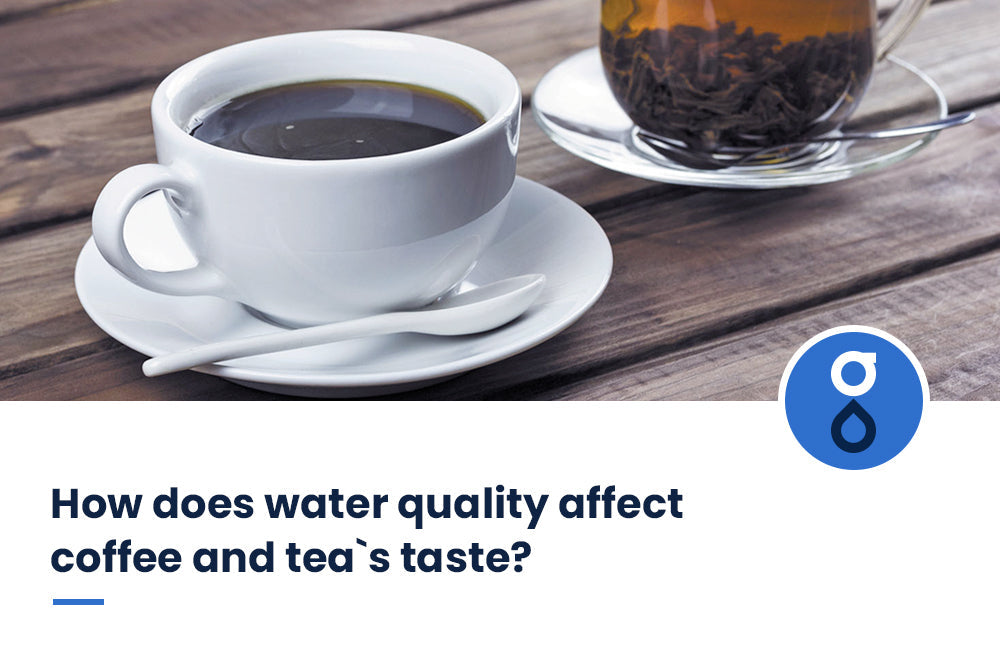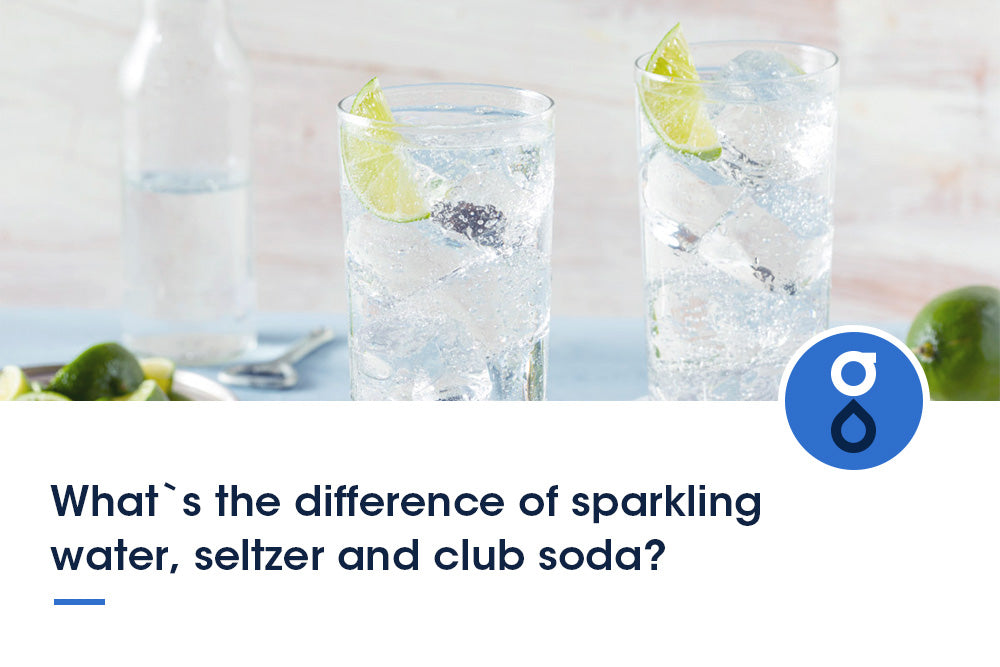Table of Contents:
How to define water quality
Types of water used for coffee and tea
Factors influence the coffee and tea`s taste
The health benefits of drinking coffee and tea brewed with filtered water
Tips for making better-tasting coffee and tea
FAQs
Conclusion
When it comes to making coffee and tea, it's all about the taste. But have you ever considered how much of an impact water quality can have on the flavor? It may surprise you to learn that your water supply's condition can change how your favorite hot drinks turn out. In this article, we'll explore how water quality affects coffee and tea's taste so you can brew a flavorful cup every time.
No matter which type of beverage you're preparing, starting with clean water is essential. From minerals and contaminants to pH levels and chlorine content, all these factors play a role in the flavor of your drink. When getting that perfect cup of joe or a delicious pot of tea, the right combination will make all the difference. Let's take a closer look at how water quality affects coffee and tea's taste.
How to define water quality?
Water quality is an important factor in the taste of coffee and tea. The way water tastes can drastically change the flavor of a beverage, so it is important to understand what makes up water quality. Water filters are often used to remove contaminants and determine whether or not a water source is suitable for use in beverages like coffee and tea. Filtered water can be tested for levels of chlorine, lead, minerals, pH balance, and other elements that might affect the flavor of coffee or tea. Ultimately, understanding the components of filtered water can help ensure that coffee and tea taste great. It's important to consider what types of water are used for making these beverages.
Types of water used for coffee and tea
Different types of water can have other mineral contents and acidity levels, which can significantly affect the taste of your drink.
Tap Water

Tap water is the most commonly used source for brewing coffee and tea. However, the quality of tap water can significantly affect the taste and overall quality of our favorite beverage. Unfiltered tap water may contain organic compounds, minerals, and other impurities that can lead to a sour or metallic taste in coffee and tea. This is why it's important to filter tap water before brewing your favorite cup.
Bottled water

Bottled water is one popular type used for brewing coffee and tea. It is readily available for purchase and is convenient for those who prefer water that has been treated and purified. Different options are available for bottled water, including spring water, purified water, and mineral water. Spring water comes from natural underground sources and is often bottled at the start. It is known for its clean and refreshing taste and its genuine mineral content. Purified water, on the other hand, undergoes a rigorous treatment process that removes impurities and contaminants. Mineral water has a specific mineral composition that can provide additional health benefits to the consumer.
Several factors must be considered when choosing a specific bottled water brand for brewing coffee and tea. One significant factor is the mineral content of the water. Minerals such as magnesium and calcium can enhance the flavor of coffee and tea when present in the correct quantity. The pH level of the water is also crucial since it determines the acidity level of the brewed beverage. Water with a pH range between 6.5 and 7.5 is best for coffee and tea brewing.
Filtered water
Filtered water is a popular choice for making coffee and tea as it provides a good, clean taste. Many people prefer filtered water for their beverages as it can be free of contaminants that could affect flavor or cause health issues. Filtered water also eliminates the need to purchase bottled water for making drinks, which can be both wasteful and expensive.

Filtering water involves passing it through screens or filters to remove solid particles and bacteria from the liquid. This can include using physical filters such as sand, activated carbon, reverse osmosis, or chemical treatments such as chlorine dioxide. After passing through the filter, the water is ready for coffee and tea without adding additional ingredients.
Since filtered water is an excellent option for making coffee and tea, many households have invested in a filtration system they can use on tap water. This allows them to enjoy clean-tasting beverages at home without worrying about contamination or added chemicals. Some restaurants also use filtered water in their specialty drinks so customers can enjoy an even better cup of coffee or tea.
Distilled water

Distilled water is created through water distillation, which involves heating water until it turns into steam and then collecting the moisture and condensing it back into the water. This process removes any impurities or minerals in the original water source, resulting in pure water. The minerals in the water, such as calcium and magnesium, can affect the taste of coffee and tea. Using distilled water with no mineral content can produce a flatter taste requiring more complexity. This is why many coffee and tea enthusiasts recommend using softer water sources, such as tap water or bottled spring water, which contain beneficial minerals while remaining relatively pure. While distilled water may be the purest form of water for brewing coffee and tea, there may be better choices for commercial use. The loss of minerals in distilled water can result in a less complex flavor profile. A balance between purity and mineral content should be considered for the best taste.
Factors influence the coffee and tea`s taste
Coffee and tea are two of the most consumed beverages globally, with an estimated 2.25 billion cups consumed daily worldwide. Using hot water, both drinks extract flavor and aroma compounds from the plant material. However, several factors can influence these beverages' taste, aroma, and overall quality.
Minerals in water
Water minerals are naturally occurring inorganic substances, such as calcium, magnesium, and potassium, found in varying water concentrations. Calcium and magnesium are the two most common minerals found in water and significantly affect coffee and tea taste. Calcium ions bring out a sweeter and brighter flavor in coffee and tea, while magnesium produces a slightly more bitter and earthy flavor. However, both minerals are essential for human health and can benefit the beverage. The optimal mineral content for brewing coffee and tea is often described as 'balanced' or 'optimal.' Generally, the ideal range of mineral content for brewing coffee and tea is between 50-150 ppm (parts per million) of total dissolved solids (TDS). This range of minerals creates a balanced flavor, enhances natural flavor profiles, and improves brewing.
PH levels
High pH levels in water can result in a bland taste, which can be unappealing to coffee and tea drinkers. The recommended pH range for brewing water is 6.5 to 7.5 pH. Anything outside this range could impact the flavor of the final product. Therefore, maintaining a neutral pH in water is crucial to brewing the perfect cup of coffee or tea. Mineral content and TDS levels are vital in achieving the desired taste and aroma. By using water with the recommended pH range and balanced mineral content, coffee, and tea drinkers can enjoy their favorite beverage to the fullest.
Water hardness
Water hardness is measured in parts per million or milligrams per liter. A reading of fewer than 60 ppm is considered soft water, while anything above 120 ppm is categorized as hard water. Between these two ranges is moderate hardness.

Soft water is best for coffee brewing as it has fewer mineral ions, which means it doesn't interfere with the flavor and aroma of the coffee. On the other hand, hard water can significantly affect the taste of coffee, making it taste metallic, sour, and sometimes acidic. It's a different story for tea brewing, as tea has a lower temperature than coffee. Therefore, using soft water can cause insufficient extraction of tea flavor compounds. Moderately complex water is ideal for tea brewing as it balances the extraction of the tea's flavor and other minerals in the water.
The health benefits of drinking coffee and tea brewed with filtered water
Coffee and tea that are brewed with filtered water have several health benefits:
- The filtration process removes any sediment or impurities that can hurt coffee and tea's flavor and aroma.
- Filtered water contains fewer chemicals than unfiltered water, which can also affect the taste of coffee and tea.
- Using filtered water to brew your beverages helps to reduce your exposure to potential contaminants like lead or arsenic.
The use of filtered water for brewing these beverages also provides numerous aesthetic benefits as well:
1. Coffee and tea created with filtered water are less bitter and more flavorful;
2. The color of the beverage is brighter;
3. The aroma is much more potent and enjoyable.
These advantages make it worth investing in a good quality filter for your home brewing system to enjoy the full potential of your favorite coffee or tea blends daily. With access to better-quality drinking water, you can experience elevated satisfaction with each cup you brew! By improving your home brewing experience, you will be rewarded with a superior cup every time.
Tips for making better-tasting coffee and tea

If you are a coffee or tea enthusiast, you know how important it is to brew a good cup. Here, we will cover several tips for making better-tasting coffee and tea by focusing on water quality, brewing method, temperature, freshness, and amount.
Water quality
When considering the impact of water quality on coffee and tea, it is essential to view hardness and mineral content. Soft water, with low mineral content, is ideal for brewing as it allows the full flavor of the coffee beans or tea leaves to shine. However, hard water is high in mineral content and can result in a metallic or sour taste. If you are still determining the quality of your tap water, consider investing in a water softener or filtration system to improve the taste of your brew.
Brewing method and temperature
The method and temperature used to brew coffee or tea can significantly impact the final taste of your cup. For coffee, consider using a pour-over or French press method, which allows for a slower brewing process and a fuller flavor. Additionally, the ideal temperature for brewing coffee is between 195-205°F. For tea, different temperatures are recommended based on the type of tea. For example, green tea should be brewed at 180°F, while black tea should be brewed at 200°F.
Freshness
Another critical factor in brewing excellent coffee and tea is the freshness of the beans or leaves. Coffee beans and tea leaves start to lose their flavor over time, so buying them as fresh as possible is best. Moreover, store your coffee beans or tea leaves in airtight containers away from light and heat to maintain their freshness.
Amount
Finally, using the appropriate amount of coffee or tea per serving is crucial to balance the flavor of your brew. Using too little will result in a weak and tasteless cup while using too much can produce a bitter and overpowering taste. Follow the recommended amount of coffee or tea per serving to ensure the better taste.
FAQs
What is the ideal pH level for brewing coffee and tea?
The ideal pH range for brewing coffee and tea is between 6.5 and 7.5. If the water pH is too low or high, it can negatively impact the flavor of your beverage.
What is the best water temperature for making coffee and tea?
When it comes to tea, the optimal water temperature varies by the type of tea. Black tea should be brewed at 208°F, while green teas range between 150°F to 180°F, and herbal teas between 200°F to 212°F. Generally, the lower the water temperature, the lighter and more delicate the tea will taste. On the other hand, higher temperatures produce a heavier, strong brew. The ideal water temperature for brewing coffee is between 195°F and 205°F.
Conclusion
In conclusion, water quality is essential to getting the best coffee and tea. Filtered water can make all the difference when creating a delicious cup of joe or a soothing cup of tea. Not only does filtered water result in better-tasting drinks, but it also helps provide health benefits. So, let's raise our mugs and cheers to a future with good-quality coffee and tea brewed with filtered water! If you still need to figure out how to get the best quality filtered water, many resources online can help. Glacier Fresh may be your optimal choice, from learning about different filtration systems to finding out what kind of water works best for making coffee and tea!
















